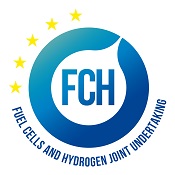Remote Laboratory
The Remote Laboratory module focuses on Solid Oxide Fuel Cells (SOFC) testing. This module introduces the basic principles for electrodes, cells and stacks testing, with DC and AC characterization techniques, with a seminar on the effect of contaminants in SOFC and a remotely controlled experiment on a SOFC cell.
A total of 10 h of lectures and 4 h of remote laboratory are provided in the module:
- Introduction to fuel cell testing: basic principles for electrodes, cells and stacks testing
- DC polarization techniques for fuel cell testing and ASR extrapolation
- AC techniques: introduction to EIS principles and EIS data interpretation methods
- SOFC components: testing of sealants and interconnects
- Tutorial on SOFC remote laboratory for polarization experiments
- Laboratory for remote SOFC experiment: cell polarization and data analysis
- Seminar: impact of contaminants on SOFC performance
- SOFC testing: outlook and concluding remarks
These lectures are delivered sequentially in the above order, with a short test before the laboratory lectures to verify that students have reached a sufficient level of understanding (minimum score required) before applying the knowledge in a laboratory experience.
The lectures provide an introduction to the electrochemical testing, presenting different test set-up configurations and the basics of DC characterization of cells by polarization. The choice of sealing, contacting, operating conditions are also addressed. An overview of AC characterization techniques for electrodes and cells is also provided, introducing the basics of impedance spectroscopy (EIS) and techniques for EIS data interpretation.
The laboratory lectures are delivered fully online and consist in a demo trial for the remotely controlled SOFC test-rig and in a polarization experiment. A test-rig located in the laboratory of Politecnico di Torino is made available to students for remote control. The students will have the control of test variables and will have a task to complete using the equipment remotely controlled, choosing the operating conditions in order to achieve the given task by applying the knowledge acquired in the lectures. A report, elaborating the data acquired from the experiment, is required at the end of the laboratory.
The module is completed by a seminar lecture on SOFC contaminants and their impact on cell performance and a final summary on the state-of-the-art of SOFC characterization techniques.
|

